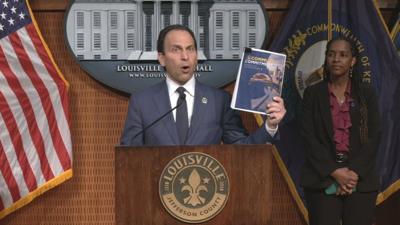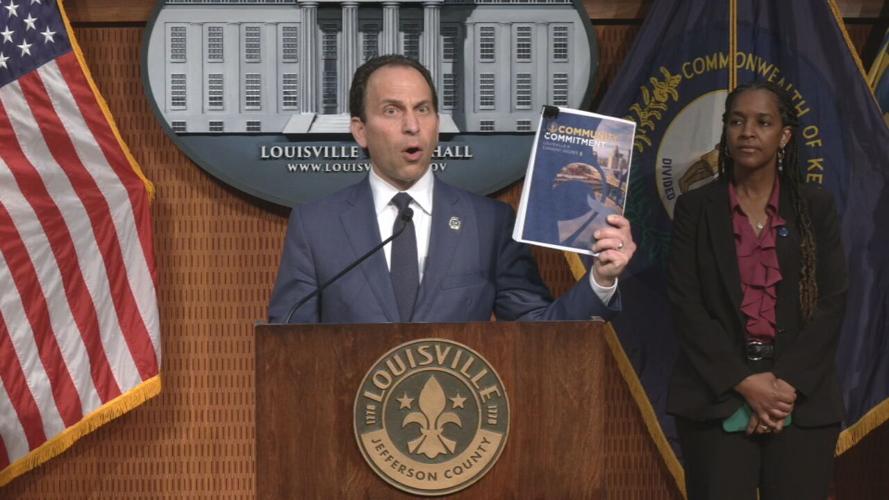LOUISVILLE, Ky. (WDRB) -- A federal judge on Friday didn't immediately dismiss a sweeping police reform agreement between the U.S. Department of Justice and Metro Government, as the Trump administration has requested, but indicated he would likely do so soon.
U.S. District Judge Benjamin Beaton said that he doesn't believe there "is much sense or utility in a court trying to force a case like this to persist when the (DOJ) doesn't want it to and the city doesn't resist that position."
In addition, Beaton, as he has throughout the process, remained critical of unanswered questions regarding the DOJ's investigation of Louisville Metro Police and how it was conducted.
"The basis for these allegations has always puzzled me," he said during a virtual hearing.
The judge said it is a "source of great puzzlement" that the DOJ "refused to share" information and analysis used to conclude that LMPD violated civil rights of citizens.
The hearing Friday was initially scheduled for the Justice Department to answer a series of questions from Beaton about how the investigation was conducted and what the findings were based on.
But Trump officials moved Wednesday to dismiss consent decrees in Louisville and Minnesota, among other cities, saying the agreements "would have imposed years of micromanagement of local police departments by federal courts and expensive independent monitors, and potentially hundreds of millions of dollars of compliance costs, without a legally or factually adequate basis for doing so."
The current DOJ administration has also been critical of the two-year investigation, saying in a statement Wednesday that "the United States no longer has confidence in the strength of its case and no longer believes that the proposed consent decree would be in the public interest."
Andrew Darlington, acting chief of the Justice Department's Civil Rights Division's special litigation section, told Beaton that "with new leadership, we are reviewing our policies and procedures moving forward."
The city, however, has said repeatedly it is not fighting the findings in the investigation and is moving forward to implement the ordered reforms.
"We accept the findings as presented in the 2023 report," Megan Metcalf, Mayor Craig Greenberg's deputy general counsel, told the judge.
Beaton noted that it is up to the federal judge to make the final determination on whether to dismiss the decree, which was reached in the final days of the Biden administration. Given the amount of time and effort the investigation took, Beaton wanted to issue a formal written order.
The city and Justice Department negotiated for nine months before agreeing to the consent decree in December.
Metcalf said the city isn't fighting the DOJ request because the consent decree needs both parties to be successfully enforced. Without the federal government involved, "it would frustrate the underlying purpose of what was negotiated," she said.
Greenberg said Wednesday that he expects Beaton will approve the quest for dismissal and the city will implement its own version of the agreement called "Community Commitment – Louisville's Consent Decree."
"This community commitment will lead to the same results we were pushing for in the court-ordered consent decree," Greenberg said, adding that Metro government will hire its own third-party entity to monitor the results.
Asked by Beaton if the city's self-proclaimed "Louisville's Consent Decree" differed at all from what would have been in the court-ordered and monitored decree, Metcalf said it "contains all the same objectives."
The agreement stems from a 248-page DOJ report in 2023 that concluded Louisville police and Metro government for years engaged in practices that violated the U.S. Constitution and federal law, including excessive use of force and searches based on invalid warrants.
Greenberg said the city will hire an independent monitor to ensure that reforms are made, with a yearly contract renewal process likely to last about five years.
During the hearing Friday, Darlington said the DOJ is still interested in working with Louisville, and other departments, and will share with the city any information from the investigation it is able to.
The DOJ report began a process that ultimately sough court oversight of the agreed-upon reforms.
With a court-ordered consent decree, the city or LMPD would be held in contempt if they refuse or fail to intact the changes. It would also fund an independent monitor who would oversee the police department's progress and report to the court.
Still, Greenberg and LMPD Chief Paul Humphrey have pledged they will have independent oversight of the agreement even if it's not a court-mandated process. The mayor proposed $750,000 to fund a monitor position in his budget plan now before Metro Council.
Under the agreement, the department would revise its use-of-force and training policies, improve search warrant practices, ensure traffic stops are conducted legally, ensure the fair investigations of police misconduct and address sexual harassment allegations in the department, among other reforms.
The deal addresses 13 specific areas, from traffic stops to officer assistance, and requires police to show "substantial compliance" with the promised changes before each section is satisfied.
The findings of the Department of Justice investigation came nearly two years after the 2020 police killing of Breonna Taylor, which prompted both local and national criticism of the police department as well as months of protests.
Then-U.S. Attorney General Merrick Garland listed myriad examples of Louisville police misconduct and crimes, such as throwing drinks at pedestrians, racial disparities in arrests and traffic stops, assaulting citizens with disabilities and calling Black people "monkeys, animal and boy."
The federal investigation into LMPD cites 63 different incidents of alleged misconduct, according to an appendix of the 90-page report the DOJ released following their roughly two-year investigation.
Greenberg said LMPD has over the last two years changed over 260 policies and restructured its leadership and created an accountability and improvement bureau.
This story may be updated.
Related Stories:
DOJ seeks to dismiss lawsuit against Louisville police, effectively killing federal reform
Louisville urges federal judge to sign consent decree to monitor police reform deal
Louisville mayor says outside supervision of police reform deal is 'important' however judge rules
Copyright 2025 WDRB Media. All Rights Reserved.














